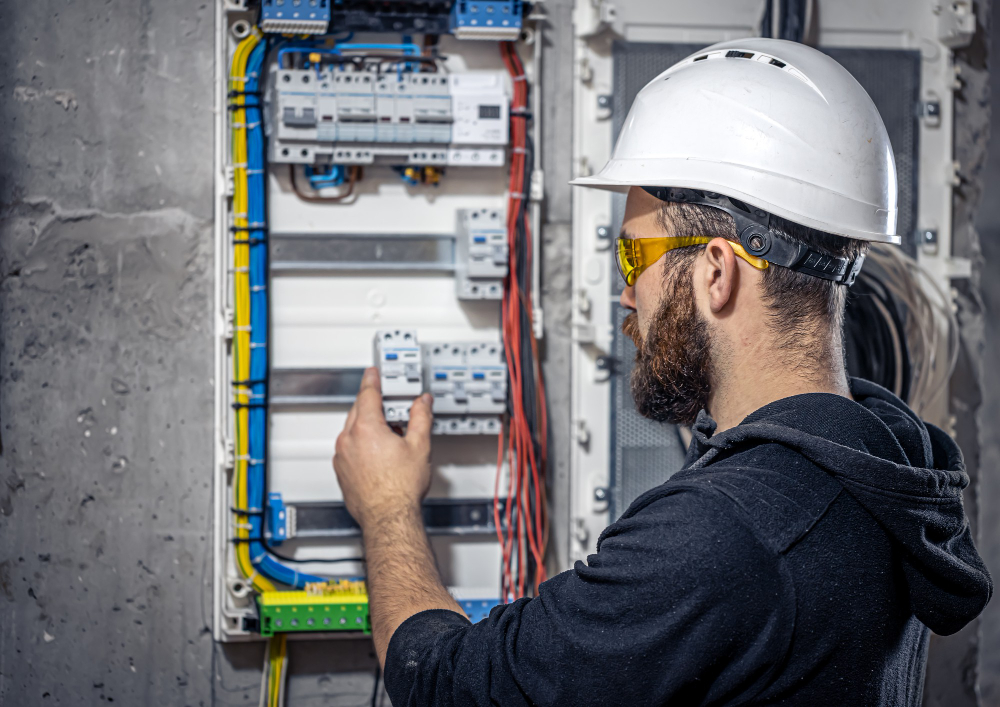Pengertian ELCB atau Earth-Leakage Circuit Breaker, Apa Bedanya dengan MCB?

Pengertian ELCB penting Anda ketahui, terutama karena perangkat ini berhubungan erat dengan kelistrikan. Seperti kita ketahui, energi listrik telah menjadi bagian yang sangat penting dari kehidupan modern. Namun, di balik manfaatnya, listrik juga membawa risiko yang cukup serius jika tidak dikelola dengan baik.
Salah satu risiko tersebut adalah kebocoran arus listrik yang dapat mengancam keselamatan manusia dan menyebabkan kebakaran. Untuk mengatasi risiko ini, ELCB (Earth-Leakage Circuit Breaker) hadir sebagai solusi. Mari kita bahas lebih lanjut mengenai ELCB, fungsinya, jenis-jenisnya, serta perbedaannya dengan MCB (Miniature Circuit Breaker).
Pengertian ELCB
ELCB, atau Earth-Leakage Circuit Breaker, adalah alat pengaman kelistrikan yang dirancang untuk mendeteksi kebocoran arus listrik ke tanah (ground) dan secara otomatis memutus aliran listrik jika arus bocor tersebut terdeteksi. Kebocoran arus dapat terjadi ketika ada kerusakan pada isolasi kabel atau komponen listrik yang menyebabkan arus mengalir ke benda yang tidak seharusnya, termasuk tubuh manusia.
Fungsi ELCB
Fungsi utama ELCB adalah melindungi manusia dari bahaya yang disebabkan oleh kebocoran arus listrik. Dalam kondisi normal, arus yang mengalir pada kabel fase (arus yang masuk) harus seimbang dengan arus yang mengalir pada kabel netral (arus yang keluar). Namun, ketika ada kebocoran arus, misalnya saat seseorang menyentuh kabel yang rusak, arus tidak lagi seimbang. ELCB berfungsi dalam mendeteksi ketidakseimbangan ini dan dengan cepat memutus aliran listrik untuk mencegah terjadinya kejadian yang fatal, seperti tersengat listrik atau kebakaran.
Jenis-jenis ELCB
Mengutip dari Schneider Electric, ELCB hadir dalam beberapa jenis yang memiliki tingkat sensitivitas berbeda, tergantung pada kebutuhan perlindungan. Berikut beberapa jenis ELCB berdasarkan tingkat sensitivitasnya.
1. ELCB dengan sensitivitas 10 mA
Digunakan di lingkungan dengan tingkat risiko tinggi, seperti rumah sakit, di mana perlindungan terhadap kebocoran arus yang sangat kecil sangat penting.
2. ELCB dengan sensitivitas 30 mA
Umum digunakan di rumah dan bangunan komersial untuk melindungi manusia dari kontak langsung dengan listrik.
3. ELCB dengan sensitivitas 300 mA
Biasanya digunakan untuk perlindungan terhadap bahaya kebakaran akibat kebocoran arus yang lebih besar, yang tidak berhubungan langsung dengan manusia.
Perbedaan ELCB dengan MCB
Meskipun ELCB dan MCB sama-sama berfungsi sebagai perangkat pengaman dalam sistem kelistrikan, keduanya memiliki perbedaan dalam cara kerja dan fungsinya.
1. Fungsi Perlindungan
MCB dirancang untuk melindungi instalasi listrik dari bahaya beban lebih (overload) dan korsleting. Ketika ada kelebihan arus yang mengalir melebihi kapasitas sistem, MCB akan memutus aliran listrik untuk mencegah kerusakan.
Di sisi lain, ELCB berfokus pada deteksi kebocoran arus yang bisa membahayakan manusia dan. ELCB tidak bereaksi terhadap beban lebih atau korsleting, melainkan terhadap arus bocor yang keluar dari jalur yang seharusnya.
2. Cara Kerja
MCB bekerja dengan mendeteksi panas yang dihasilkan oleh arus berlebih atau kejutan listrik. Ketika arus melebihi batas yang ditetapkan, MCB akan memutuskan rangkaian listrik pada sistem.
ELCB bekerja dengan mendeteksi perbedaan arus antara kabel fase dan netral. Jika arus yang masuk tidak seimbang dengan arus yang keluar, ELCB akan segera memutus aliran listrik.
Perangkat ELCB dari Schneider Electric
ELCB adalah perangkat penting untuk perlindungan dari kebocoran arus listrik, yang dapat menyebabkan kebakaran atau kecelakaan fatal akibat tersengat listrik. Meski sering disandingkan dengan MCB, kedua perangkat ini memiliki fungsi yang berbeda. MCB melindungi dari arus lebih dan korsleting, sedangkan ELCB memastikan tidak ada kebocoran arus yang berbahaya bagi manusia.
Jika Anda sedang mencari ELCB yang bagus dan berkualitas untuk sistem listrik rumah atau bangunan, lebih baik pilih produk dari merek elektrikal yang sudah teruji, seperti Schneider Electric. Perangkat ELCB dari Schneider menawarkan perlindungan kebocoran arus yang aman dan telah memenuhi standar keselamatan.
Terdapat 2 jenis ELCB Schneider yang bisa Anda pilih sesuai kebutuhan, yaitu dari seri Domae ELCB dan Acti9 ilD. Rangkaian produk Domae ELCB dirancang dengan 2 tipe sensitivitas, yaitu 30 mA dan 300 mA. Tingkat perlindungan ini membuat Domae ELCB sangat cocok digunakan di sistem listrik rumah dan apartemen.
Sementara itu, seri ELCB Schneider Acti9 ilD dibuat untuk aplikasi yang lebih berat dan kompleks. Seri ini mempunyai 3 tipe sensitivitas, yaitu 10 mA, 30 mA, dan 300 mA. Dengan demikian, aplikasi ELCB Acti9 ilD ini lebih cocok digunakan untuk industri dan kebutuhan sensitivitas tinggi, seperti rumah sakit.
Memahami pengertian ELCB serta fungsinya dapat memberikan Anda pilihan yang tepat dalam melindungi sistem listrik di rumah atau bangunan. Hanya gunakan perangkat ELCB berkualitas dari Schneider Electric yang asli dan terpercaya. Anda bisa mendapatkan berbagai produk ELCB tersebut di Mitra Cipta Hardi Elektrindo dan Hokione.
Powered by Froala Editor

Powered by Froala Editor
Related News



